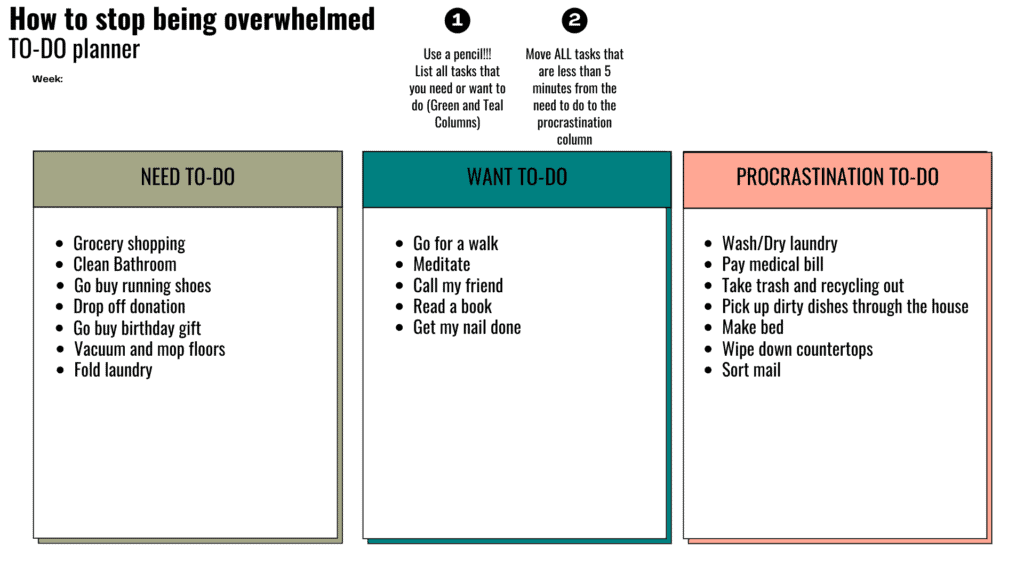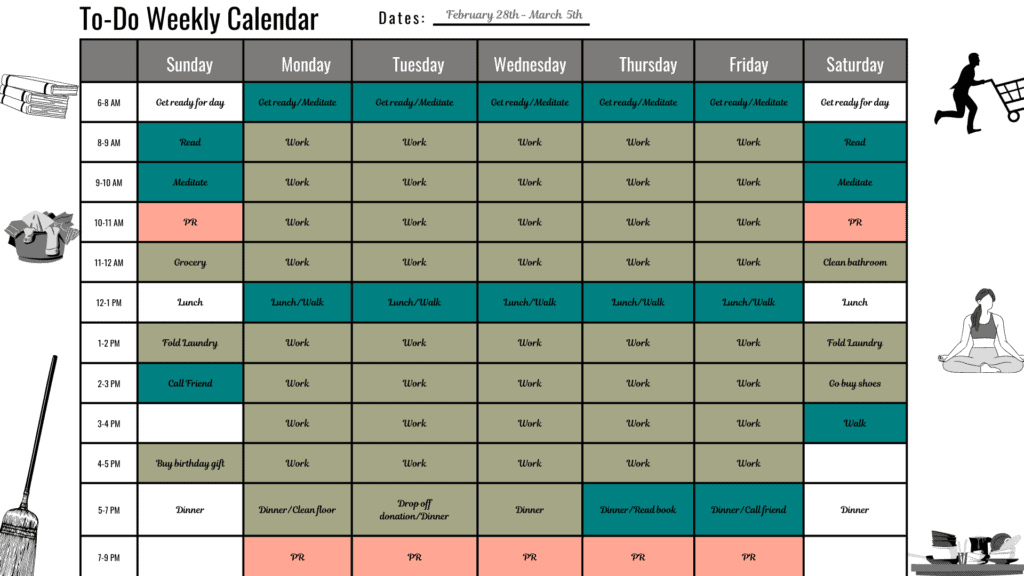This post may contain affiliate links. If you click one and make a purchase, I earn a small commission at no extra cost to you. It helps support the site so I can continue to offer great content to you!

Each of us feels overwhelmed, stressed, and even depressed at one point or another. Some have a much easier time overcoming the feeling and putting their life back on the right track. Others struggle to a point where they find themselves incapable of moving forward. This blog post is all about helping you learn how to stop feeling overwhelmed with clear and simple tactics.
First and foremost – acknowledge the feeling
Feelings can be confusing. They tend to overlap with each other and one emotion can disguise itself as a different one. You may feel sadness, anxiety, stress, or even anger. All of these can be masking the feeling of being overwhelmed. So how do you know what you are truly feeling?
A few signs tend to be associated with being overwhelmed. Some of the most common signs are heart racing, difficulty concentrating on a task and/or switching tasks constantly, insomnia or poor sleep, low energy, tiredness, lack of motivation, and difficulty being present in your life.
Journaling your feelings can help you acknowledge that you are indeed overwhelmed. The next step is to take action to stop feeling overwhelmed. And the great news is that this is not as difficult as it seems!

How to stop feeling overwhelmed
First step – take a 30 minutes mental break
As soon as you are able, excuse yourself and take a break. If you can, go outside. It has been scientifically proven that spending time in nature has many benefits on stress levels. It can improve your mood, reduce stress and anxiety and help you see the bigger picture to name a few.
Go outside, pause and practice controlled breathing. Take same length inhalation and exhalation. For example, inhale on the count of 3 and exhale on the count of 3. While you do so, you can also repeat an affirmation that is helpful like “I am in control”. The feeling of overwhelm is a feeling of not being in control and not knowing how to take back control. Getting control of your breathing is showing your mind that you are in control.
You can feel overwhelmed temporarily due to a specific situation. For example, you have to give a speech in front of a large audience. In this case, you may be feeling overwhelmed with stress or fear. This type of overwhelm usually passes once the situation is over.
Alternately, you may be feeling overwhelmed by life. You have too much on your plate and/or too much on your mind. This is the type of overwhelm we will focus on in this article.
Second step – write everything down
Start a list of all the things that you need to do. Separate them between the things you NEED to do versus the things you WANT to do. Both categories are important. You need time to do activities you enjoy doing in order to feel fulfilled in your life. I would not list basic life things like showering, eating, sleeping, or even working. You will get those in regardless and it will simply clutter your list.
Once you have your lists completed, look at the NEED to-do list and take any tasks that would take less than 5 minutes to do, and put them on a separate list. That is your “procrastination to-do list”. There is likely no valid reason for these tasks to be on your list for long as they can be completed quickly. However, 10 short tasks can still require 1 hour to complete when you add them up and your brain can feel tricked and overwhelmed by a large number of them.
You should now have 3 lists: need to-do, want to-do, and “procrastination to-do”.

Third step – implement time blocking
Look at your daily calendar for the next few days and create time blocks for your different lists. If you work from 8-5, this block would be considered a “Need to-do” time block where you would write something like “work” in your calendar. However, if you have an hour’s lunch break, you could use 15-30 minutes to complete other tasks on your list. An example would be to fit in a “Want to-do” task, for example calling your friend or a “Procrastination to-do” task like paying your medical bill.
Use your time wisely and make sure you incorporate “want time” AND some rest time. You do not want to over-schedule yourself. Be realistic and do not create time-blocks over times when you perform routine daily activities like sleeping, cooking, showering. Also, keep some empty time blocks for free time or unexpected activities.
Sometimes, the simple steps of listing what you need to do and planning out when you can perform each tasks is enough to lower the feeling of being overwhelmed. That is because sometimes our perception is skewed. We might think there is too much for us to do and leave us feeling helpless until we put everything on paper and see that things are not quite as bad. If you you feel overwhelmed consistently, you should consider creating permanent time blocks to keep you on track long term.

Well-being habits to support yourself to stop feeling overwhelmed
To ensure you can effectively support your body and mind and stop feeling overwhelmed when facing this emotion, you need to maintain several well-being habits. Our environment demands more and more from us. Planning and operating in a more efficient manner is part of the puzzle but must be implemented alongside a solid foundation of consistent well-being habits.
1. Get proper sleep
Studies have shown that not getting enough sleep can increase your stress level. Increased stress levels can then increase the overwhelm feeling. When you are overly tired, your ability to act on how to stop feeling overwhelmed is lowered and you can be stuck in a vicious cycle. There is no perfect amount of sleep as we are all unique individuals but for most adults, sleeping a minimum of 7 hours per night is supportive of maintaining general well-being.
2. Maintain a healthy nutrition
Healthy nutrition is a necessary way to support your amazing body. Eating food with a high nutritional value will provide you with adequate energy to perform your daily responsibilities. Proper nutrition supports a healthy immune system that will help prevent you from getting sick. Lastly, some studies suggest that a diet rich in omega-3 and plant-based food can have stress-fighting effect by reducing cortisol levels. Here are examples of foods believed to have the ability to lower cortisol levels:

- Food fortified in vitamin B: whole grains, eggs, beef, nutritional yeast
- High omega 3 food: salmon, tuna, olive oil, chia seeds, flax seeds
- Magnesium rich food: broccoli, spinach, pumpkin seeds, dark chocolate, avocado, banana
3. Move your body
Take time every single day to move your body. Exercise boost your endorphins level which is the feel good hormone, helping you feel calmer. In addition, when you exercise your body experiences a feeling similar to stress. By exercising often you train your body to respond to stress and manage it efficiently. Physical activity has so many benefits that you should want to move your body regardless of stress level. It can help you maintain a healthy weight, improve your mood and help you sleep better. Studies have shown that aerobic exercise, even a brisk walk increase blood flow to your brain and may delay or reduce the symptoms of Alzheimer.
In conclusion, nobody should go through life with a debilitating sense of overwhelm. Whether the feeling is affecting you sporadically and on a regular basis, there are ways to overcome it. Try implementing some of the tips from this article and remember that you are unique and might need to adjust some of these to better suit your personality. I hope this blog post, which was all about learning how to stop feeling overwhelmed has been helpful to you. Feel free to share some of your tips with me in the comments below.
Cat xx

